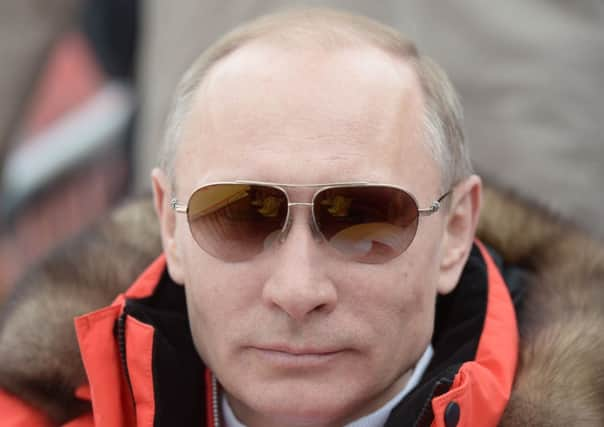I want Crimea peace, Putin tells Cameron


Mr Cameron called the Kremlin yesterday as world leaders joined a fresh round of efforts to persuade Moscow to pull back from its incursion into the Ukrainian territory.
Downing Street said the president “did want to find a diplomatic solution” and was ready to consider the setting up of a contact group to facilitate dialogue with the new government in Ukraine.
Advertisement
Hide AdAdvertisement
Hide AdHe will discuss the idea with his foreign minister SergeyLavrov today.
Moscow, which does not recognise the interim government in Kiev, has so far ignored the threat of American and European sanctions designed to force it to pull back from Crimea.
The Duma has endorsed a decision by Crimea’s parliament to become a part of Russia subject to approval of a 16 March referendum – a vote dismissed as illegal by Western nations.
Amid reports of pro-Ukrainian groups being attacked by pro-Russian groups at a rally in the Crimean port of Sevastopol, Ukraine’s interim prime minister said his country “won’t budge a single centimetre from Ukrainian land”.
“Let Russia and its president know this,” Arseniy Yatsenyuk told a crowd in Kiev marking the 200th anniversary of the birth of poet and nationalist Taras Shevchenko.
Foreign Secretary William Hague warned of “the great danger of a real shooting conflict” if Moscow sought to extend its control beyond the majority-Russian Black Sea peninsula, which was part of Russia until 1954.
Mr Hague rejected Mr Putin’s claims insignia-less troops in de facto control of Crimea were local fighters not Russian personnel – saying “all the evidence” said they were.
Despite criticism of the failure of the European Union to impose sufficiently stringent sanctions on Moscow, Mr Hague insisted there was no “tacitacceptance” of the takeover in the Crimea.
Advertisement
Hide AdAdvertisement
Hide Ad“It would be wrong to conclude that Russia has won in some sense. I think this will turn out over time to be quite a big miscalculation,” he told BBC1’s Andrew Marr Show. “The long-term effect will be to unite Ukraine more against Russian domination of their affairs and to recast European policies in a way that will reduce Russianleverage over Europe.”
The EU has suspended talks with Moscow on visa liberalisation and threatened asset bans and travel freezes on Russian officials if there is no progress to a diplomatic solution.
Washington, less constrained by fears of the economic consequences on its own economy, has taken a harder line – moving to punish Russian figures suspected of involvement.
Mr Hague said that there was “clearly an increased case for American gas exports to Europe” and other measures to reduce reliance on Russian energysupplies.
Energy secretary Ed Davey said an escalation of the situation into a prolonged military conflict could lead to higherenergy bills in the UK.
“The companies who supply gas and electricity tend to buy their gas forwardly, so theybuy 18 months in advance. So they shouldn’t be using it asan excuse to put up people’s prices,” he told the Andrew Marr Show. “When this crisis broke, there was a spike in oil and gas prices. They’ve now come down, I’m pleased to say. But of course if there was an escalation, if we saw military conflict, if that conflict went on for months and months and months, there could be an impact on prices.”
SEE ALSO